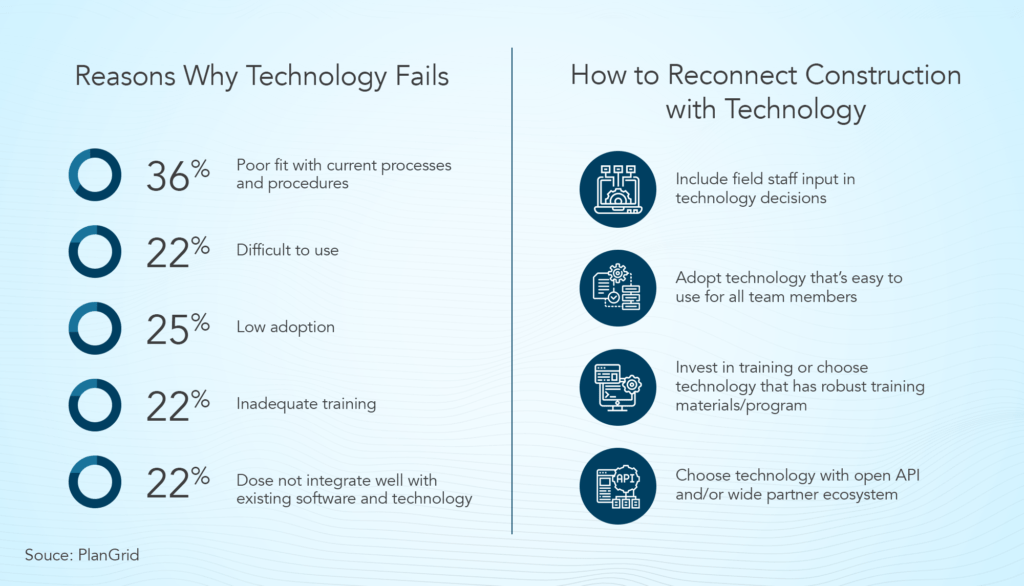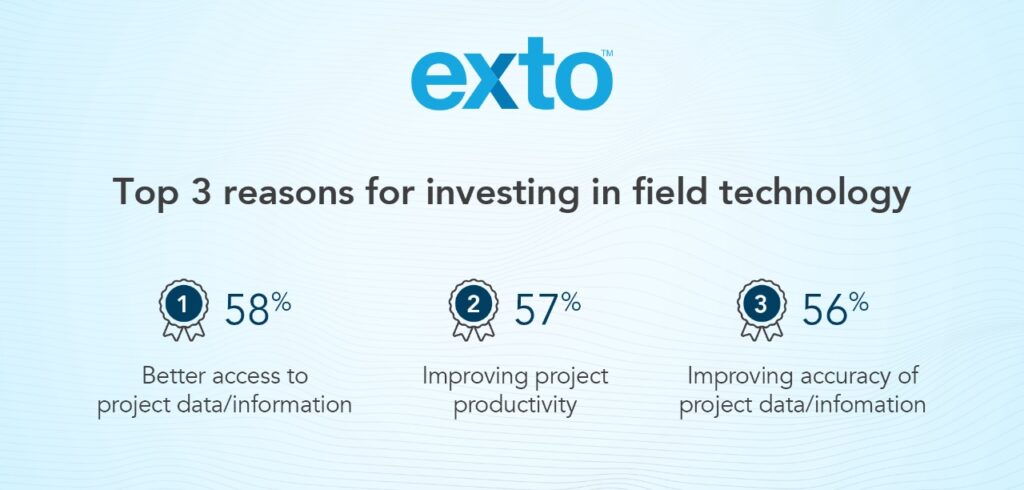Data Analytics
in Construction
to the Rescue
Data is the most powerful tech currency in the world. Tech giants like Google, Facebook, and Twitter all base their business plans around data. Harvesting, searching, analyzing, and implementing data-driven decisions is one of the most crucial aspects of any modern business.
Construction is an industry that is ripe for data analytics. It can provide insights that were not possible before data became easily harvestable and usable. For example, data analytics can predict how long a project will take, how much material will be needed, and what the most efficient construction methods are.
But the construction industry is lagging with digitization and advanced data analyses. As the industry recovers post-COVID, it is facing tighter margins, stringent regulations, and lagging productivity growth. Using the power of data analytics, it’s possible to improve efficiency in the construction space.
What is Data Analysis?
Data analysis is the discipline of making data useful. It’s an extensive process of collecting, transforming (filtering out the clutter), organizing, analyzing (identifying trends and patterns), and ultimately interpreting it by drawing conclusions, making predictions, and driving informed decision-making. It helps separate the noise surrounding the data and provides the signal we are looking for.
The goal of data analysis is to turn this raw data into actionable insights for an organization.
The adoption of digital tech and new tools is also rapidly producing data as a byproduct. In fact, over 40 zettabytes of data around the world will be created within the next 2 years.
This is an absurdly large number. Currently, the total amount of data in the world amounts to 32 ZB. Imagine more than doubling it in only two years. But converting data into insight requires strategic intent, a data culture, and a methodical system. Designing a data strategy will help unlock the potential of data already stored in your organization.
When analyzing data, analysts take the cleaned data and ask questions using them. Asking the right questions is just as important as knowing your data. If you don’t ask the right questions, you won’t find the right answers.
Data in the Construction Business
Data analysis can also help identify trends and optimize processes. This can involve anything from analyzing project costs and timelines to analyzing the data collected from construction sites.
Until recently, the data environment in construction was not sophisticated enough for advanced construction analytics. Software like Exto has allowed data to be collected straight from the tool. With a constant stream of data, organizations can process real-time data, and make decisions immediately.
Whether it’s real estate construction, renewable energy parks, or data centers, the application of data science in construction keeps on expanding.
Data analysis can help identify problems and inefficiencies in the construction process, giving the opportunity to address them in a timely manner. Plus, it can help predict future trends in the construction industry, which helps inform decision-making.
Some questions data can help answer:
- Is there any process we can streamline?
- What do we already know about projects of this type?
- What is the average timeline for this process??
- Can we reduce on-site time wastage by 20%?
- Given an unforeseen circumstance, how much delay should we expect?
- How do we factor in cost overruns based on past experience?
- How do we compare to industry benchmarks?
- Can this action reduce uncertainty?

How are Construction Firms Using Data?
Using work management tools like Exto, organizations can collect data throughout the entire construction process. Whether it’s planning a process, commissioning items, or tracking delays, it’s all possible using cloud management platforms. Using the power of AI and Predictive Analysis, this collected data can also help fix issues in real-time or make better decisions for future projects.
Here are some areas your team can support through data analysis.
Project Planning
During project planning, data analysis can help quantify and mitigate risk factors during the project planning phase. Using past project data, companies can factor delays into the timeline and optimize schedules by using weather data, traffic, and regional activity data. Work management platforms, like Exto, provide the ideal base for conducting operations while simultaneously allowing for easier data analyses.
Productivity
By using a mix of worker wearables and IoT sensors on machinery; data analysis can help find exact information to increase workplace productivity.
Construction Safety
Collecting and tracking safety data, measuring workplace incidents, and then finally analyzing this data may help point to certain deficiencies in the safety checklist, which can improve workplace safety.
Forcasting
Predictive analytics, especially using AI and ML, helps make decisions based on models that craft outcomes and weigh probabilities of certain events. These technologies can be used in construction to improve processes and workflow, or even predict future events. This can be helpful in construction because it can be used to predict how long a project will take, how much material will be needed, and what the most efficient construction methods are.
Data Tells Stories
Project sites are increasingly becoming digital and connected. Whether it’s IoT connected equipment, RFID tags that track materials and equipment, BIM generated data, job site data, photos, LIDARS sensors that produce geospatial data, and more; data generation in construction is everywhere.

In other words, there is a lot of data that can be collected and analyzed. Nearly every action can be turned into data points. If everything can be quantified or measured, data analysis can improve output, cut costs, and optimize the process. However, the amount of data can be almost overwhelming, and it’s hard to filter the noise out and focus on what matters.
As such, data analysis in the construction industry is becoming increasingly important. Soon, it won’t just be an additional measure, but as important a step in the construction process as the commissioning or planning phases.
Knowing how to collect, handle, store, and investigate the vast amounts of data flowing through can provide actionable insights leading to more efficient practices, streamlined workflow, and more productive workers.
Data is a seemingly endless resource. Finding the right questions can be just as hard, if not harder, than finding solutions. To make sense of it all, a systematic approach to data is a must.
By implementing a data-focused strategy for your organization, you can improve efficiency in processes, automate tasks, improve workflow, cut costs, reduce time and material waste, and improve workplace safety.
Do you want to learn more? Contact the Exto team to conduct an assessment on how a work management platform can assist your business.
Begin your Construction Technology Transformation Journey Today
Schedule a demo today or review the brochure to begin your construction technology transformation journey.

